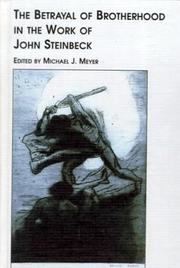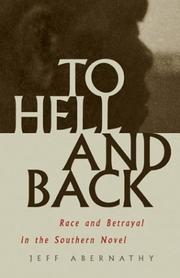| Listing 1 - 8 of 8 |
Sort by
|
Book
ISBN: 1282988336 9786612988332 1846157722 1855661888 Year: 2009 Publisher: Woodbridge, U.K. ; Rochester, N.Y. : Tamesis,
Abstract | Keywords | Export | Availability | Bookmark
 Loading...
Loading...Choose an application
- Reference Manager
- EndNote
- RefWorks (Direct export to RefWorks)
Representations of treachery in medieval and early modern Spain. Treacherous Foundations is the first sustained study of the theme of treachery in the founding myths of the Iberian Peninsula. It considers literary versions, in epic, chronicle and theatre, of the legends of Fernán González, Bernardo del Carpio and King Sancho II from medieval and early modern Spain and compares the representation of treachery across two critical periods in Spanish history, assessing its political, ideological, and cultural function. This book explores the role played by representations of treachery in foundational texts in highlighting the ideological tensions that arise from movements toward the creation of collective identities. It discusses in particular visions of nationhood and the monarchical state in the thirteenth and late sixteenth centuries. The theme of treachery is expanded to cover all aspects of treason and political disloyalty and, engaging with loyalty, trust and the nature of kingship, the volume sheds new light on aspects of Spanish cultural and political history, and provides insight into the nature of myth and collective memory, historical change and the collective response to crisis. GERALDINE COATES lectures in Medieval Spanish Literature at the University of Oxford.
Spanish literature --- Betrayal in literature. --- History and criticism. --- Founding Myths. --- Generational Differences. --- Global Vision. --- Iberian Peninsula. --- Medieval Spain. --- Political Ideologies. --- Thematic Concerns. --- Treachery.
Book
ISBN: 9780823230426 9780823230433 Year: 2009 Publisher: New York Fordham university press
Abstract | Keywords | Export | Availability | Bookmark
 Loading...
Loading...Choose an application
- Reference Manager
- EndNote
- RefWorks (Direct export to RefWorks)
American literature --- Betrayal in literature --- Comparative literature --- Ethics in literature --- Race relations in literature --- Minority authors --- History and criticism --- Theory, etc
Multi
ISBN: 9780823237326 9780823230426 9780823230433 Year: 2009 Publisher: New York, N.Y. Fordham University Press
Abstract | Keywords | Export | Availability | Bookmark
 Loading...
Loading...Choose an application
- Reference Manager
- EndNote
- RefWorks (Direct export to RefWorks)
Literature --- American literature --- Betrayal in literature --- Comparative literature --- Ethics in literature --- Race relations in literature --- Minority authors --- History and criticism --- Theory, etc
Book
ISBN: 0719098246 1781708835 0719098254 9780719098253 9780719088537 9780719098246 9781526127105 0719088534 9781781708835 Year: 2015 Publisher: Manchester
Abstract | Keywords | Export | Availability | Bookmark
 Loading...
Loading...Choose an application
- Reference Manager
- EndNote
- RefWorks (Direct export to RefWorks)
This title argues that modern Irish history encompasses a deep-seated fear of betrayal, and that this fear has been especially prevalent throughout Irish society since the revolutionary period at the outset of the twentieth century.
English fiction --- History and criticism. --- History and criticism --- Betrayal in literature. --- Literature --- Literary Studies: From C 1900 --- -LITERARY CRITICISM / European / English, Irish, Scottish, Welsh --- Ireland --- Irish authors --- English literature --- Betrayal. --- Ireland. --- Joyce. --- Novel. --- Treason.
Book
ISBN: 9780748676620 0748676627 9780748655830 0748655832 9780748655854 0748655859 9780748655847 0748655840 9780748655823 0748655824 1299105580 9781299105584 Year: 2012 Publisher: Edinburgh : Edinburgh University Press,
Abstract | Keywords | Export | Availability | Bookmark
 Loading...
Loading...Choose an application
- Reference Manager
- EndNote
- RefWorks (Direct export to RefWorks)
"Penelope Anderson's original study changes our understanding both of the masculine Renaissance friendship tradition and of the private forms of women's friendship of the eighteenth century and after. It uncovers the latent threat of betrayal lurking within politicized classical and humanist friendship, showing its surprising resilience as a model for political obligation undone and remade. Incorporating authors from Cicero to Abraham Cowley and Margaret Cavendish to Mary Astell, the book focuses on two extraordinary women writers, the royalist Katherine Philips and the republican Lucy Hutchinson. And it explores the ways in which they appropriate the friendship tradition in order to address problems of conflicting allegiances in the English Civil Wars and Restoration. As Penelope Anderson suggests, their writings on friendship provide a new account of women's relation to public life, organized through textual exchange rather than bodily reproduction." [Publisher's description].
English literature --- Female friendship --- Friendship in literature. --- Betrayal in literature. --- Friendship between women --- Friendship in women --- Women's friendship --- Friendship --- History and criticism. --- Women authors --- History --- Women --- Intellectual life --- Human females --- Wimmin --- Woman --- Womon --- Womyn --- Females --- Human beings --- Femininity

ISBN: 0773478353 Year: 2000 Publisher: Lewiston Mellen
Abstract | Keywords | Export | Availability | Bookmark
 Loading...
Loading...Choose an application
- Reference Manager
- EndNote
- RefWorks (Direct export to RefWorks)
Betrayal in literature --- Brotherliness in literature --- Brothers in literature --- Religion in literature --- Abel (Biblical figure) --- Cain (Biblical figure) --- Steinbeck, John, --- In literature. --- Characters --- Brothers. --- Criticism and interpretation. --- West (U.S.)

ISBN: 0820324868 0820325783 Year: 2003 Publisher: Athens University of Georgia press
Abstract | Keywords | Export | Availability | Bookmark
 Loading...
Loading...Choose an application
- Reference Manager
- EndNote
- RefWorks (Direct export to RefWorks)
African Americans in literature --- American fiction --- Betrayal in literature --- Race in literature --- Race relations in literature --- Social ethics in literature --- History and criticism --- Twain, Mark, --- Influence. --- Southern States --- In literature.
Book
ISBN: 1137595876 1137595884 Year: 2016 Publisher: London : Palgrave Macmillan UK : Imprint: Palgrave Macmillan,
Abstract | Keywords | Export | Availability | Bookmark
 Loading...
Loading...Choose an application
- Reference Manager
- EndNote
- RefWorks (Direct export to RefWorks)
'The book is a pleasure to read: straightforward, clear, in every way well-written. Containing admirably detailed discussions of Stephen Dedalus, Leopold Bloom, and Molly Bloom from the perspective of a topic so important to Joyce, Fraser brilliantly analyzes their motivations, actions, thoughts, and feelings as exemplifications of the theme of betrayal.' - J. Hillis Miller, UCI Distinguished Research Professor of Comparative Literature and English Emeritus, University of California, Irvine, USA 'The centrality of the idea of betrayal in Joyce’s works is one of the truisms of modernist criticism, but, as James Fraser demonstrates in this invigorating study, the issue has never been examined in the depth and with the subtlety it deserves. Fraser, in drawing out the complexity of the repeated drama of dedication and betrayal in Joyce’s writing, brings to the topic an attentiveness to the literary texts (including the often-neglected Exiles) and an alertness to their historical and political contexts that enable him to do it full justice.' - Derek Attridge, Professor of English, University of York, UK 'Joyce scholarship has assumed that the notion of ‘betrayal’ is so well-known it barely needs mentioning, when in fact there has been little specific explication of the theme. But here is a thorough, incisive analysis of the complexities of betrayal that shows Joyce’s literary and narrative attachment to that idea.' - John Nash, Reader in the Department of English, University of Durham, UK This book offers a fundamental and comprehensive re-evaluation of one of Joyce’s most pervasive themes. By showing that betrayal was central to how Joyce understood and depicted the difficulties and terrors at the heart of all relationships, this book re-conceives Joyce’s approach to history, politics, and the other. Leaving behind the pathologising discourses by which Joyce’s interest in betrayal has been treated as an ‘obsession,’ this book offers a vision of Joyce as both dramatist and theorist of betrayal. It demonstrates that, rather than being compelled by some unconscious urge to produce and reproduce textual betrayals, Joyce had a deep and hard-won conception of the specific dramatic energies wrapped up in the language and structures of betrayal and repeatedly found ways to make use of this understanding in his work.
Literature. --- Literature, Modern --- Fiction. --- Twentieth-Century Literature. --- 20th century. --- Betrayal. --- Betrayal in literature. --- Ethics --- Literature, Modern-20th century. --- Fiction --- Metafiction --- Novellas (Short novels) --- Novels --- Stories --- Literature --- Novelists --- Philosophy --- Literature, Modern—20th century. --- Joyce, James, --- Criticism and interpretation. --- Dzhoĭs, Dzheĭms Avgustin Aloiziĭ, --- Džoiss, Džeimss, --- Gʻois, Gʻaims, --- Joyce, Giacomo, --- Joyce, James Augustine Aloysius, --- Jūyis, Jīms, --- Tzoys, Tzaiēms, --- Tzoys, Tzeēms, --- Zhoĭs, Zheĭms, --- Joyce, James Augustine Aloysius --- Joyce, James --- Dzhoĭs, Dzheĭms Avgustin Aloiziĭ --- Džoiss, Džeimss --- Gʻois, Gʻaims --- Joyce, Giacomo --- Jūyis, Jīms --- Tzoys, Tzaiēms --- Tzoys, Tzeēms --- Джойс, Джеймс --- Джойс, Джеймс Августин Алоїсуїс --- Zhoĭs, Zheĭms --- ג׳ויס, ג׳ײמס, --- ג׳ויס, ג׳יימס, --- ジョイス --- ジェームスジョイス, --- Joisi, Jeims,
| Listing 1 - 8 of 8 |
Sort by
|

 Search
Search Feedback
Feedback About UniCat
About UniCat  Help
Help News
News